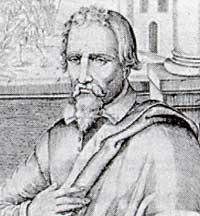Servet, Miguel
(1511-1553)

Doctor, philosopher, astronomer and theologian from Navarre, founded in 1511 in Tudela, who died in the town of Villanueva de Sigena de Huesca. Son of a notary of Aragon and following the steps of his father, he studied law and theology at the University of Tolosa from 1530. He collaborated with the confessor of Carlos I in Valladolid, Alpujarras and Toledo. This position allowed him to make numerous trips through Italy and Germany, in which he held numerous discussions with Catholic and Protestant theologians. He settled in Basel in 1931 and in the same year he wrote the book De Trinitatis erroribus. Soon religious discussions began and he had to go to Lyon.
He took care of the geography of Ptolemy and in 1535 he collected his theories in the book Ptolomaei geographicae enarrationis libri octo.
In 1937 he entered the University of Paris and enrolled in the Faculty of Medicine. He began to study blood circulation in the lungs, but his ideas had no echo until Harvey published an explanation of blood throughout the body. In 1537 he published the book Apologetica disceptatio pro astrología, which was judged in Paris as an inheritance. From there Joan also had to flee. He was a doctor of Charlieu, Lyon and Vienne and in 1541 he occupied French citizenship. At that time he met Joan Kalbin and for many years they had great controversies. They were defeated enemies, as they were then able to prove. In 1553 he published the treatise on theology Christianism restitutio, probably without thinking that it would accelerate the arrival of his death. Servet outlined in this work the new vision of the Holy Trinity, arguing that it is no more than three distinct ways of naming God. Joan Kalbin's response was immediate: she was accused of heresy and was detained in Vienne. He managed to escape and, on his way to Italy, he was again detained in Geneva. Although he defended himself well in the trial, Kalbin showed himself against the powerful and managed to condemn him to burn alive. Miguel Servet was therefore the Navarrese, the first Christian thinker who promised to die for the acceptance of Catholics and reformists.
Buletina
Bidali zure helbide elektronikoa eta jaso asteroko buletina zure sarrera-ontzian











